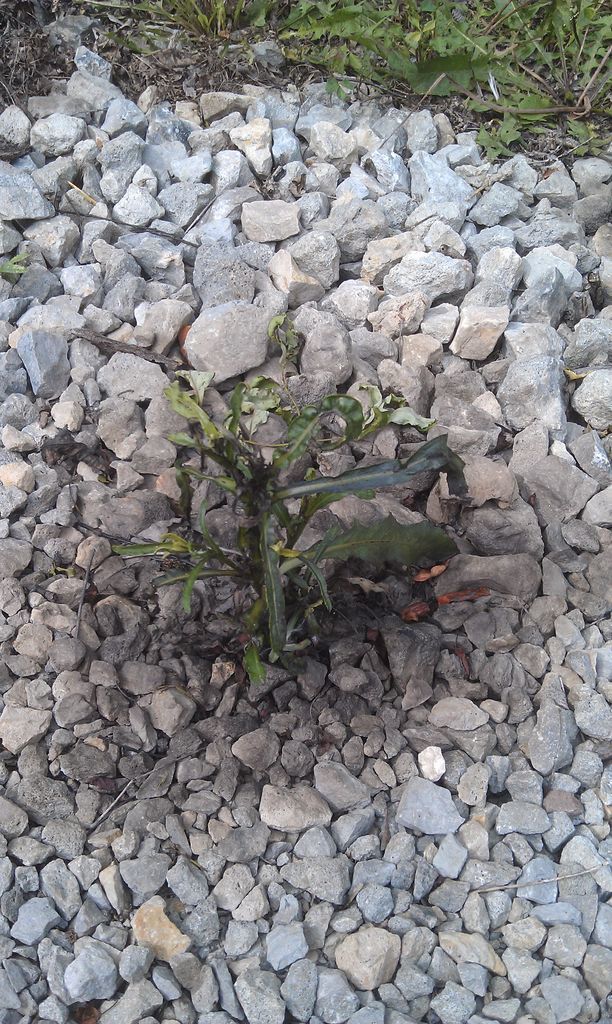For some time I’ve been interrested in using the wood gas condensate (from the fuel hopper only) as a weed killer. I’ve dumped it on weeds in the past and killed them dead. I wanted to see if using it in a garden sprayer would work as a substitute to roundup. So a couple weeks ago I put 2 gallons in my backpack sprayer and hit the driveway. I gave some weeds in the driveway and along the edges a good coating. I was pleasantly surprised that the smell was like a summer campfire instead of roundup. A week went by and some of the weeds were struggling but in general they were not dead. So I gave them another healthy coating and waited another week. The result of this experiment, as I observed, is that a few of the weeds died but most did not. These pictures were taken about a week after the 2nd coating. I believe that with repeated topical coatings from the sprayer eventually the weeds would die. In reality, however, this is impractical as I don’t have the time repeat this activity time and time again. I believe this condensate is quite deadly when it gets to the roots, but as a topically applied herbicide its results are very poor. Thought I’d share my experience with the group in case others were wondering.
Hey John
Thanks for the results. I was wondering about how it would work. Always learning I love it.
Take Care
Good Morning John,
I think to use the hopper condensate as a weed or grass killer it would need to be in high concentration and to the roots.
I dispose of most of my hopper condensate poring it over my junk or scrap iron piles to temporally kill back the weeds.
The below pic shows were I poured about a gallon.
In March I had the opportunity to attend an organic grower school and the subject of hopper condensation came up and Jon Nilsson a soil expert ( one of the instructors ) claimed if the condensate was deleted down to about 10% and sprayed on garden vegetables it enhanced growth .
Good Evening Wayne.
If the hopper condensate can be cut to 10% of original strength and it enhances growth it tends to indicate that it isn’t a poison to plants…but a fertiliser or mineral type thing of sorts
i got myself well in the doghouse once 10 or so years back by mixing the fertiliser for the vege garden a bit strong and killing everything…probably would have helped if i had read the mixing instructions a bit more carefully…it quite clearly said on the barrel mix 1:20 fert to water…i read 1:2…i’ve learned to read instructions a little more diligently since then
Hi John, Wayne and Callum,
a couple years back I was working for “Amazone” (not Amazon!), a company which manufactures farm machinery here in Germany, a couple miles away from my place. I was in charge of development and testing of their centrifugal fertilizer spreaders. We had a test hall, where the spreaders and different types and brands of fertilizers were tested in order to compose the setting charts for our machines and in order to further develop the spreading system.
In the test hall, there was, of course, a lot of dust and fines from various fertilizers in the air and on everything that was present during the tests. Being strongly hygroscopic, this stuff would soon turn into a damp, glibberish and soggy mess. In order to protect my clothes, I was wearing a lab-coat-type overall most of the time. Over time, I would collect single grains of fertilizer in its pockets from the spreading tests. Normally I would empty them in the hall. But one time, when I was back at my desk in the design office, I thought I would do those office plants a favor and give them a good treat (only 2 or 3 grains each…I figured this can’t hurt them). These plants had been fostered and nourished by the (mostly female) draftspeople and technizians over years and decades.
A week later, 2 out of 7 or 8 plants had died, the others were in a bad shape but survived in the end.
I was having a rather hard time amongst my colleagues after that - they loved to call me the “expert on plant nutrition” also in front of customers (with a big grin on their faces) …
Moral: “The dose makes the poison. The right dose makes the difference between a poison and a remedy.” (Paracelsus)
Best regards,
Sam





